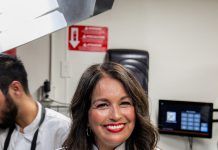Amy Reichert, 54, is a private investigator who has owned her small practice for 22 years. She’s running against County Board of Supervisors District 4 incumbent Nathan Fletcher with three primary goals: to lower the cost of living in San Diego County, solve what she calls a “homeless epidemic” and increase public safety.
“I’d like to focus on the homeless population that is hardcore addicted to drugs. I took a ridealong with a San Diego police officer through downtown San Diego where you see the greatest concentration of homeless people. Along the way, I asked how many people living in those encampments have drug and alcohol addictions. He said 100%, and that a large segment of that population is struggling with severe mental health issues,” Reichert said.
To reach that niche of homeless residents, Reichert would expand county homeless outreach teams with social workers and behavioral health care workers, modeled after efforts like La Mesa’s Homeless Outreach Mobile Engagement program which is structured so that outreach workers and mental health clinicians are dispatched to nonemergency homelessness-related calls. She would also like the county to distribute homeless individuals utilizing motel room vouchers throughout the county.
Currently, according to county representatives, vouchers are distributed for facilities in the cities of San Diego, Chula Vista, Santee, Escondido, Vista and El Cajon.
“However, we must have enforcement as well. I’m not talking about the aged-out foster kid, the person who doesn’t have rent money— I’m talking about the people on drugs, alcoholics, people who commit crimes because of their addictions. We need to have enforcement for breaking the law,” Reichert said.
On the same ride-along, she also asked the original cause of the homeless encampments and was told Proposition 47, which was enacted in 2014 and reduced some felony-level crimes to misdemeanors and decriminalized others, coincides with homeless encampments popping up.
The non-profit and non-partisan Institute for Public Policy Institute of California website states “We find no evidence that violent crime increased as a result of Proposition 47… We find some evidence that Proposition 47 affected property crime” and while the reform had no apparent impact on burglaries or auto thefts, it may have contributed to a rise in larceny thefts.
“We are at a tipping point, much like in the early 1990s where the three strikes law came up. Justice without mercy is not justice but mercy without justice is also not mercy. We’re allowing people to victimize others with no consequences. We need people to be held accountable while upholding their civil rights,” Reichert said.
While completing her B.A. in political science at San Diego State University, she said, she worked in a Juvenile Detention program for male gang members and considers herself familiar with the culture. She would like the county to buffer gang-prevention programs which were shuttered for COVID-19.
She would also like to direct county policy away from a Vehicle Miles Traveled tax because it “does not meet the needs of families” who rely on cars.
“I do not believe our trolley and bus systems meet the needs of families. If you have one, two, three kids: are you going to be able to take the trolley to their soccer games? If you have three kids in different schools, an elementary, a middle schooler and a high schooler, are you going to take the bus to drop them off and pick them up? If you have a sick kid in the middle of the night, are you going to be able to jump on the trolley to get to urgent care? Our public transportation right now does not practically solve family needs,” Reichert said.
The buildings being built near trolleys, she said, don’t meet the needs of families and new construction needs to be built for different income levels and lifestyles; designing around public transportation inadvertently keeps some families from opportunities that cannot be reached without a car, Reichert said and reduces their housing options.
She said, she drives from La Mesa to Spring Valley for school drop off and pickup.
“The congestion is bad, the air quality is bad, there are frequent accidents there. It’s a bottleneck but the solution is better engineering,” Reichert said, designed in a way to keep traffic moving along rather than taxing residents for their commute.














